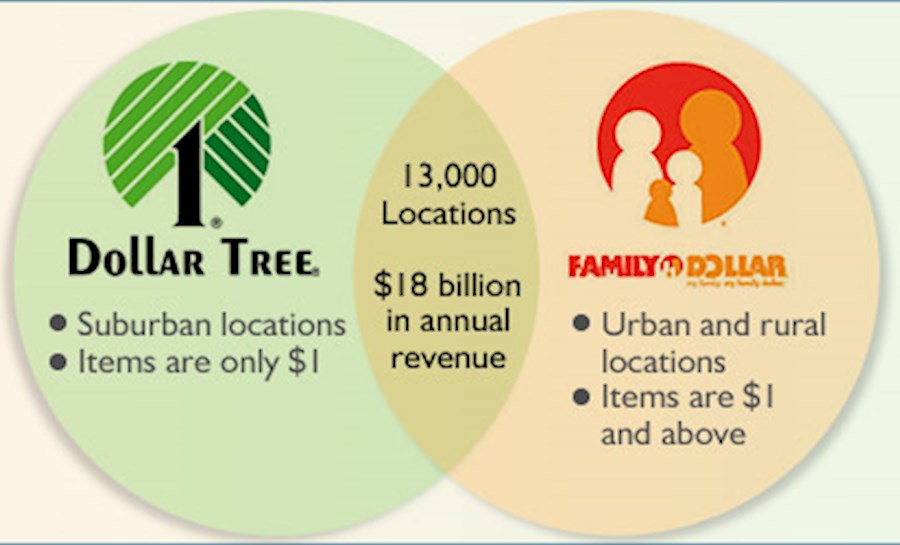Last week, bargain retail favorites Dollar Tree, Family Dollar, T.J. Maxx, and Goodwill made headlines with big announcements that rattled the discount shopping world.
- First, Dollar Tree announced its plans to purchase its rival, Family Dollar, for $8.5 Million dollars.
- Then, analysts projected that T.J. Maxx will take Macy’s spot on the leaderboard for retail sales.
- Finally, Federal authorities contacted Goodwill to launch an investigation about a potential credit card breach.
With Q4 Holiday shopping season right around the corner, how will these announcements effect money-savers, discount retail shoppers, and consumers looking for great deals? The Daily Deduction takes a deeper dive.
What Happens When Dollar Tree and Family Dollar Join Family Trees?
As it stands today, Dollar Tree stores are mainly found in suburban areas, while Family Dollar stores are typically found in urban and rural areas. After the two companies merge, the chains will have more than 13,000 locations that serve all area densities and an annual revenue of $18 billion. The merger is unlikely to drastically affect Q4 sales, as the deal is expected to close during Quarter 1 of 2015.
As discount shoppers, we hope this means good news for the product mixes found in Dollar Tree stores in 2015. Family Dollar typically offers a mix of quality name-brand pet supplies, groceries, apparel, and health and beauty products. Family Dollar also offers a wider variety of seasonal, home and garden, and greeting card items than Dollar Tree does today. Dollar Tree features a popular selection of decorative household items, cleaning supplies, craft and home office supplies, automotive, books, dairy items, baked goods, and frozen foods. In an ideal world, combining the product selections of the two discount chains might finally create the discount haven we’ve been searching for.
In the real world, we can expect that overlapping product lines will merge, phasing out some lines and offering few options for similar products. How will the pricing model change? Dollar Deals—another Dollar Tree owned store—already sells Dollar Tree’s national and private-brand offerings at prices that are $1 and up. Will the Family Dollar stores join the Dollar Tree lineup in this same capacity?
T.J. Maxx Sales Up, Plans to overtake Sales Lead Over Macy’s
T.J. Maxx is making a bigger name for itself as reports of sales demonstrated an increase. Annual sales projections lead analysts to believe that T.J. Maxx will beat Macy’s in retail sales soon.
What happens when discount retailers overtake the vendors that they purchase from? Some posit that vendors will reduce shipments to discount stores or stop selling to them altogether. In the case of T.J. Maxx, the discount retailer shares its success with the vendors. According to Fortune, vendors strategically supply T.J. Maxx with excess product so that both retailers can make money. As demand for T.J. Maxx products soars, so do the profits of suppliers. Under this strategy, vendors broaden their market reach and create brand fans. These brand fans help engender competition between retail stores.
Possible Credit Card Breach at Goodwill Dates Back to 2013
According to a statement on Goodwill’s website, Federal authorities and a fraud investigative unit contacted Goodwill late in the afternoon last Friday about a potential credit card number theft. This incident is currently under investigation.
Sources claim that the pattern of fraud on cards previously used at Goodwill can be traced across at least 21 states. The same source says that this breach could have begun in the middle of 2013.
If the investigation does uncover a credit card breach, Goodwill will be following in the footsteps of five large retailers and restaurants—Target, Neiman Marcus, Michaels, Sally Beauty, and P.F. Chang’s—who have recently had major data breaches.
As a small, non-profit organization, Goodwill could have become a target for cybercriminals because it fits the profile for an organization that does not spend as much to protect themselves against cybercrimes as larger companies do.
Goodwill Industries International features discount storefronts that collect and then sell donated clothing and goods. The company then uses the proceeds to make a difference in their local communities by helping partners find competitive employment. Goodwill Industries International has 2,900 stores and 165 regional headquarters across the United States and Canada and made over $3.9 billion in retail sales last year. According to Goodwill’s Director of Public Relations, Goodwill has no centralized point-of-sale system.
For now, shoppers should be careful about using credit cards at Goodwill and monitor their account balances carefully if they have recently made purchases at a Goodwill store.
Will the impending investigation mean that Goodwill spends more on cybersecurity? Spending more overhead might mean that the already-higher priced thrift store (among competing non-profit thrift stores) might have to raise their prices or (in some locations) reduce or eliminate color of the week discounts.
eSmart Tax continues its commitment to saving you money by offering affordable online federal and state tax preparation at the prices advertised—no extra fees for filing and no hidden charges. Our software uses encryption levels that are similar to what banks and financial institutions use to keep your information private and secure. Our dedicated team stays on top of the latest cyberthreats and continually updates the software to minimize security and fraud vulnerabilities. For additional information about eSmart Tax’s efforts to keep your information secure please contact Customer Support at support@esmarttax.com.
